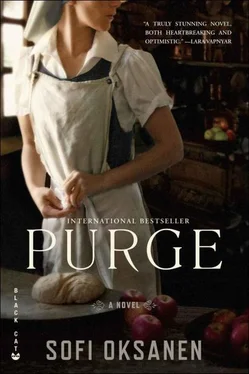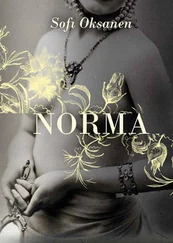The next day, Zara asked her mother what she had been saying and what language she had been speaking. Her mother tried to brush the question aside, puttering around with the tea and bread, but Zara was insistent. Then her mother told her that her grandmother was speaking Estonian, repeating the words to an Estonian song. She said Grandmother was getting a little bit senile. But she told Zara the name of the song: “Emasüda.” Zara impressed it upon her mind, and when her mother wasn’t home, she went to her grandmother and said the name. Grandmother looked at her, looked straight at her for the first time, and Zara felt her gaze press itself through her eyes and right into her-into her mouth, her throat-and she felt her throat tighten, and her grandmother’s gaze sank down her throat toward her heart, and her heart started to strain, and it sank from her heart to her stomach, and her stomach started to churn, and it sank to her legs, which started to tremble, and from her legs it sank into her feet, which started to tingle, and she felt hot, and Grandmother smiled. That smile became their first game, which sprouted word by word and started to blossom mistily, yellowish, the way dead languages blossom, rustling sweetly like the needle of a gramophone, playing like voices underwater. Quiet, whispering, they grew their own language. It was their shared secret, their game. As her mother did housework, her grandmother would sit in her usual chair, and Zara would take out toys and other things or just touch an object, and Grandmother would form its name in Estonian, silently, with her lips. If the word was wrong, Zara was supposed to notice it. If she didn’t know the word, she wouldn’t get any candy, but if she caught the mistake, she always got a mouthful of sweets. Her mother didn’t like it that Grandmother gave her candy for no reason-or so she thought-but she didn’t bother to intervene beyond a disapproving sniff. Zara could keep the delicious words, the sweet tongue, and those rare stories that Grandmother told about a café somewhere there, a café where they served rhubarb crumble with thick whipped cream, a café whose chocolate cream puffs would melt in your mouth and whose garden smelled of jasmine, and the rustle of German newspapers-but not just German; Estonian and Russian ones, too-and tie pins and cuff links, and women in fine hats, you could even see dandies in dark suits and tennis shoes, with clouds of magnesium blowing out of a house where they had just taken a photograph. The promenade along the shore at the Sunday concert. A sip of seltzer in the park. The Koluvere princess who haunted the streets at night. The raspberry jam on french bread in the warmth of the stove on a winter night, with cold milk to drink! And red currant nectar!
Zara packed her suitcase again, piled everything on top of the hotel brochure and stockings, closed the case, and put it back in its place in the wardrobe. Grandmother had turned back to the window to stare at the sky. You couldn’t put a blanket over the window in the winter, even though there was a draft, though they tried to seal up everything as well as they could. Grandmother had to be able to see the sky-even at night, when there was nothing to see. She said that it was the same sky they had at home. And the Big Dipper was important to her, because it was the same Big Dipper they had at home, it was just a little fainter-sometimes you really had to search for it. It was always easy to get Grandmother to smile with the Big Dipper-Zara just had to point to it and say its name. As a child, Zara hadn’t understood why. It wasn’t until later that she realized that Grandmother was talking about Estonia. She was born there, just like Zara’s mother was. Then the war came, and the famine, and the war had taken Grandfather, and they had to escape the Germans. They had come to Vladivostok, and there was work here, and more food, too, so they had stayed.
“Would it be wrong to go to Germany to work?” Zara asked her grandmother.
Grandmother didn’t turn her head. “You’ll have to ask your mother.”
“But she won’t say anything. She never says anything. If she wants me to go, she won’t say anything, and if she doesn’t want me to go, she won’t say anything.”
“Your mother’s a woman of few words.”
“Of no words, you mean.”
“Now,” Grandmother said reproachfully.
“I don’t think she cares whether I’m here or somewhere else.”
“That’s not true.”
“Don’t defend her!”
Zara slurped her tea angrily. The tea went down the wrong pipe, and she started coughing until her eyes watered. She would leave. At least she would be away from the shuffling of her mother’s slippers. Other people’s mothers had been in the bombing when they were children, and they still talked, even though Grandmother said that a bomb can frighten a child into silence. Why did her mother have to be the one who was shocked by the bombs like that? Zara would leave. She would send her grandmother tons of money and maybe a telescope. She would just see what her mother would have to say when she came back with a suitcase full of dollars and paid for her school and became a doctor in record time and got them their own apartment. She would have her own room where she could study in peace, cram for tests, and she would have a Western hairstyle, and wear shiny stockings every day, and Grandmother could look at the Big Dipper through a telescope.
Läänemaa, Estonia
Zara Thinks of an Emergency Plan and Aliide Lays Her Traps
Zara woke up to the homey smell of boiling pigs’ ears snaking its way out of the kitchen. She thought at first that she was in Vladivostok-she recognized the sound of the lid rattling on the pot of boiling water, the familiar smell of gristle- her mouth was already watering-but then a feather’s shaft poked her in the cheek-it had come through the pillow- and she opened her eyes and saw the corner of an unfamiliar rya rug on the wall. She was at Aliide Truu’s house. The wallpaper was blistered, the seams of the paper were crookedly pasted. A delicate spiderweb hung faintly between the rug and the wallpaper, with a dead fly dangling from it. Zara moved the corner of the rug with a finger, and the spider skittered under it. She was just about to press the rug against the spider and flatten it, but then she remembered that killing a spider meant your own mother would die. She stroked the rug. Her scalp felt light, and her skin felt like springtime against the flannel of her buttoned nightgown. The liquor-soaked socks that Aliide had put on her had been unpleasantly cold in the evening but were warm now, and she could still smell the fragrance of soap. Zara smiled. The sun peeped in through a slit in the curtains, and the curtains were exactly as she had imagined they would be.
Her bed had been made on the front-room sofa. The back room was so full of drying plants that there was no place for a proper bed. The floor, beds, shelves, and tables were covered with newspapers. Marigolds, horsetail, mint, yarrow, and caraway were scattered over them. Bags full of dried apple slices and dried black bread hung along the walls. On the little tables in front of the window there were homemade elixirs stacked in the sunlight. One of the jars appeared to be infested, and Zara turned her gaze immediately away. The air of the back room was so heavy with the scent of herbs that she hardly would have been able to sleep there. Aliide had, in fact, made herself a place to sleep on the rag rug in front of the back room door, carefully condensing the plants’ leaves that covered the newspapers to make a space big enough for one person on the floor. Zara’s suggestion that the spot would suit her fine hadn’t suited Aliide. She had probably feared that Zara would crush the herbs when she turned over in her sleep. The drug smell filled this room, as well, but not too strongly. There were only heaps of honeycombs, a few jars, and a string bag full of garlic next to the stove. There was a pile of worn cushions beside the radio cabinet. The white lace of the pillow covers had yellowed, but they gleamed in the dimness of the room. Zara had sneaked a look at them before going to sleep. Each one had a monogram, and no two were the same.
Читать дальше












